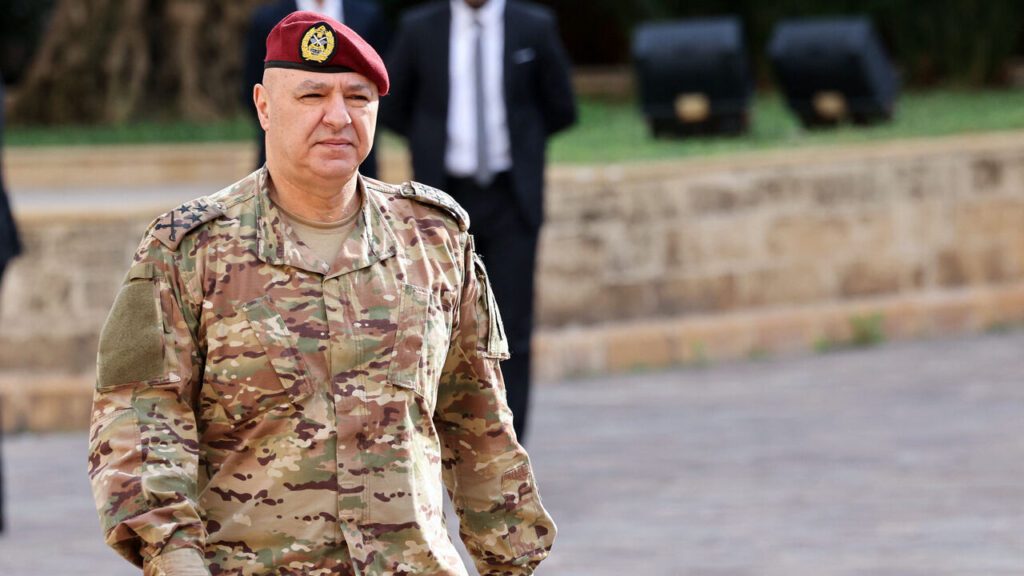Today, Lebanon’s parliament was able to elect a president after a vacuum that lasted over two years. This came after a political deadlock and 12 failed parliamentary sessions dedicated primarily for the election of a president.
Lebanese Army Commander-in-Chief, Joseph Aoun, was elected as president with 99 votes from members of parliament in the second round of voting. 15 votes went to other names, including “Sovereignty and the Constitution”, nine votes were blank and five votes were canceled, while two votes included the name of international lawyer Chibli Mallat.
The election of Aoun took place during the second round of voting, as he was unable to get more than two thirds of the vote during the first round which took place two hours prior.
In the first round, Aoun received only 71 votes from members of parliament. 37 votes were blank, 14 included “Sovereignty and the Constitution”, four were canceled and two votes went to Mallat.
Accordingly, today on January 9, 2025, the Lebanese parliament elected Aoun as President of the Lebanese Republic.
It is not the first time that an ex-army general becomes president, as the last two of the country’s presidents, Michel Aoun and before him Michel Sleiman, held the title of Lebanese Army Commander-in-Chief.
A Session Filled with Disputes and Misogyny
During the session, and particularly during the intervention of pro-change member of parliament Paula Yacoubian, Free Patriotic Movement MP Salim Aoun cut Yaboubian off during her intervention.
The situation developed into a verbal dispute between the two.
Aoun proceeded to insult Yacoubian in misogynistic terms, escalating matters to a personal level beyond mere political disagreement.
The session also included heavy discussions on whether the election of Aoun followed the Lebanese constitution, which does not allow the current Lebanese Army Commander-in-Chief to run without resigning prior.
The election of Aoun is considered an implicit amendment of the constitution. Beforehand, the same amendment took place during the election of previous president Michel Sleiman, for example.
Celebration for Some, Ambiguity for Most
The election of Aoun served to break the presidential deadlock that lasted for over two years, which alone was a reason for many to rejoice. This potentially means that the parliament would be able to resume activities to a certain degree of normalcy without this impasse, and could potentially translate to more effective government deliberations.
On the other hand, however, Aoun’s election for many brings a plethora of question marks. The president-elect has been virtually absent from public discussions, and his plans for the presidential mandate remains unknown.
This includes plans for economic progress, government formation and public office appointments, and many other necessary files.
So far, public opinion has been judging him based on his performance as Lebanese Army Commander-in-Chief, yet the responsibilities involved for the presidency are drastically different and require a different set of skills, planning and vision.
Moreover, the roles played by international actors to this end cannot be disregarded, which was obvious in the plethora of foreign politicians present in parliament during the session.
Accordingly, Lebanon has resolved one of its stickiest political files, and it remains to be seen what Aoun’s mandate will present to a country ridden by a series of continuing crises.
Aoun’s Speech
In his speech in parliament, Aoun addressed several key files that the public opinion was anticipating.
Early in his speech, he announced that the Lebanese state should hold the right to monopolize the carrying of weapons, in response to which many in the room applauded.
He also stated the need to work formally with the Syrian state to resolve a series of files, including cooperation, resolution of border issues and the displacement crisis.
More generally, Aoun presented a series of state directions which he said were aimed at ensuring a more prosperous Lebanese future. Shortly after, the electoral session was announced closed.
